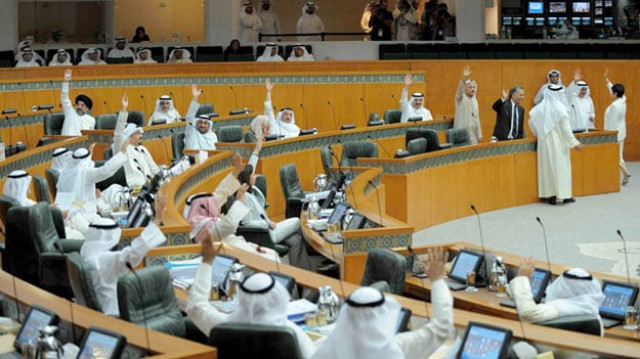Kuwaitis show unity after Shia mosque blast
Shia MP says Kuwaiti people have sent a clear message to terrorists that you will never divide this society

PHOTO: AFP
Shias, who make up about a third of the oil-rich Gulf state's 1.3 million citizens, have complained in the past of discrimination in the Sunni-ruled emirate.
But after the June 26 suicide mosque bombing, which left 26 people dead, Sunni and Shia religious and political figures presented a united front.
Emir Sheikh Sabah al-Ahmad Al-Sabah visited the Al-Imam Al-Sadeq mosque in Kuwait City only minutes after the attack by IS, a Sunni militant group that sees Shias as heretics.
Read: Bloody massacre: IS suicide bomber kills 27 in Kuwait mosque
He also ordered that the victims be considered martyrs for the nation, in a response that was well-received by Shias.
"They (the terrorists) wanted to stir a conflict between the two sects but found there is only one religion... and a united people," parliament speaker Marzouk al-Ghanem said at a reception for relatives of the victims. Shia leaders agreed.
"The Kuwaiti people gave yet another example of national unity — We became united as we were during the Iraqi invasion" in 1990, the senior cleric at the targeted mosque, Sheikh Abdullah al-Mazeedi, said at the same reception.
Shia MP Yousef al-Zalzalah said in parliament: "The Kuwaiti people have sent a clear message to terrorists that you will never divide this society."
Kuwait's largest Sunni mosque held three days of mourning and accepted condolences in a show of solidarity, while senior officials spoke out against Sunni-Shia divisions.
Kuwaiti political analyst Dhafer al-Ajmi said that if anything the bombing had brought Kuwaitis closer together.
"I believe this huge bombing will greatly contribute to boosting national unity," he said.
Read: Terror in Kuwait: Mosque attacker identified as young Saudi man
"Kuwait's society is more immune (to sectarian divisions) than other Gulf societies because of democracy and the high standard of freedoms."
Unlike most of its Gulf neighbours, Kuwait has a strong parliamentary tradition, though the emir retains ultimate authority and the country has faced calls for reform.
During a parliamentary debate this week some Shia members of parliament said the government needed to do more to end discrimination and combat extremism.
"We must win this war against terror and to do so we must end discrimination and instigation," against Shias, MP Khalil Abul, a Shia, said in the debate.
Shia political analyst Abdulwahed Khalfan said strong measures were needed. "Kuwaiti Shias are frustrated because the government has not done enough to curb sectarian instigation and practices against them," Khalfan said.
"There are people in Kuwait who fund terrorism and who are fighting with the Islamic State. What is needed is that the government should not be lenient with extremists any more and must take effective security measures," Khalfan said.
Kuwaiti authorities moved quickly after the attack, arresting several people linked to the Saudi national who allegedly carried out the bombing for IS.
Five have been referred to prosecutors to face trial in a special court.
Read: Kuwait refers five accused to prosecutors
Declaring itself in a state of war against "terrorism", Kuwait placed police and security agencies on high alert, upgraded its security plan and beefed up measures around oil facilities and other vital installations.
In a bid to prevent further attacks, parliament on Wednesday adopted a law requiring mandatory DNA testing on all the country's citizens and foreign residents to help security agencies make quicker arrests in criminal cases.
Lawmakers also approved $400 million (360 million euros) in emergency funding for the interior ministry, though some warned the new measures may still not be enough.
Despite this, many Kuwaitis remain concerned about the new attacks.
"What are the guarantees that new bombings will not take place," independent MP Jamal al-Omar asked during a parliamentary debate.
"We need a crisis management agency... and the government should set up a war council," Omar said.
"We can't really say that this was the last terror attack in Kuwait," liberal MP Rakan al-Nasef warned during the debate.



















COMMENTS
Comments are moderated and generally will be posted if they are on-topic and not abusive.
For more information, please see our Comments FAQ